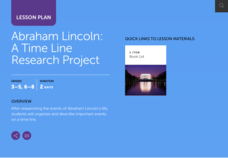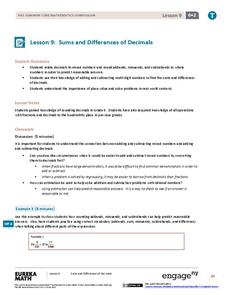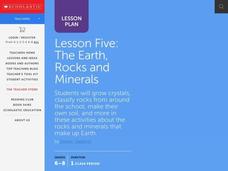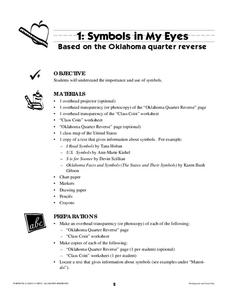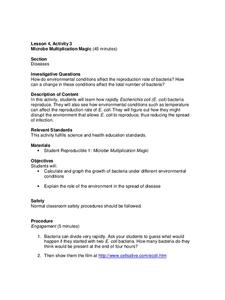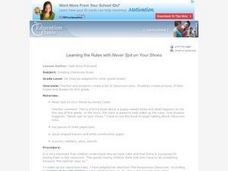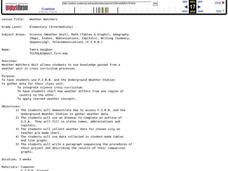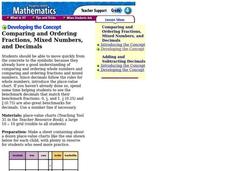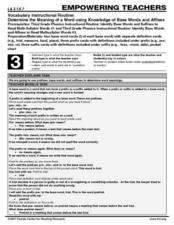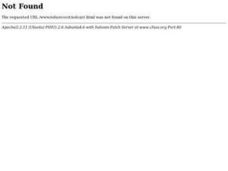Curated OER
Animals Finding Rice Paddies
Fourth graders examine the animals who live in rice paddies and create a chart. In this rice lesson, 4th graders link the types of animals living in each ecosystem with a bar graph. Students use colored bars to show...
Curated OER
Outdoor Activities/Problem Solving: Math Goes to the Playground
Students build their math skills outdoors. In this early childhood math lesson plan, students use comparative language as they chart and graph the items on their playground.
US Mint
Coin Connections
Help young mathematicians make cents out of the US currency system with this two-part math lesson. Children first learn the names and values for each type of coin, before learning to count and compare the values of coins using the...
Scholastic
Abraham Lincoln: A Time Line Research Project
Though Abraham Lincoln's life was tragically cut short, it was filled with accomplishments and inspiring moments that continue to influence American democracy. Explore the ways the 16th president of the United States made his way from a...
Curated OER
An Electro-Olympic Event: Lemon vs. Lime
Students design a battery, identify and label the anode, cathode, electron flow, ion flow, oxidation & reduction reactions, chemicals used including the location of each;and distinguish between anode materials with regard to energy...
EngageNY
Sums and Differences of Decimals
Sometimes dealing with decimals is so much easier than dealing with fractions. The ninth lesson in a 21-part module has the class consider situations when it might be easier to add or subtract fractions by first converting to...
Scholastic
Lesson Five: The Earth, Rocks and Minerals
Apply the principles of geology to a series of collaborative, hands-on class activities. Young earth scientists learn more about igneous, metamorphic, and sedentary rocks before classifying and weathering rocks that they find....
EngageNY
Solving Problems by Finding Equivalent Ratios II
Changing ratios make for interesting problems. Pupils solve problems that involve ratios between two quantities that change. Groups use tape diagrams to represent and solve classroom exercises and share their solutions.
EngageNY
Researching: Asking the Right Questions
Learners look over the iCare about the iPhone performance task and discuss how it relates to working conditions. They then review the research process and place focus on the step of asking questions. Finally, scholars ask questions to...
EngageNY
Comparing an Author’s Presentation of Ideas: “Rachel Carson: Sounding the Alarm on Pollution”
It's all in the presentation. Readers take a look at author's presentation in the article Rachel Carson: Sounding the Alarm on Pollution. Scholars work together to complete a Comparing
and Contrasting Authors’ Presentation graphic...
EngageNY
Mid-Unit Assessment: Analyzing a New Narrative about a Natural Disaster, Part II
See it through my eyes. Scholars complete mid-unit assessment part II by writing an essay describing how the narrator's point of view influences how the story is told in the text In the Middle of the Storm. Pupils also complete a...
US Mint
Symbols in My Eyes
Explore the hidden meanings behind the images on US currency with this elementary school lesson on symbolism. Starting with a class discussion about symbols, children go on to brainstorm different objects that represent the Unites...
EngageNY
Proving the Area of a Disk
Using a similar process from the first lesson in the series of finding area approximations, a measurement resource develops the proof of the area of a circle. The problem set contains a derivation of the proof of the circumference...
California Department of Education
Gaining by Giving
Community service is a win-win! Scholars discover how to gain valuable career skills through helping others using a lesson about volunteer work. Second in a six-part career and college readiness series, the activities focus on...
Agriculture in the Classroom
Farmland: GMOs and Organic Agriculture
Learn more about genetic modification, organic farming, and the role of biotechnology in agriculture by watching a documentary that shows how newly gained knowledge can be applied to specific situations involving farmers and the choices...
Centers for Disease Control and Prevention
Microbe Multiplication Magic
A lesson introduces the reproduction rate of E. coli though a video. Then scholars complete a data table and graph of reproduction rates in ideal conditions as well as less than ideal conditions.
Curated OER
Classification of Animals
Middle schoolers identify observable features of eight dinosaurs and create a sorting chart using SMART Notebook on a SMART Board (or, in case you do not have a SMART Board, a chalk or dry-erase board).
Curated OER
Learning the Rules with "Never Spit on Your Shoes"
Foster a sense of community by having youngsters work together to create a list of classroom rules. They draw pictures of their hopes for first grade after reading a children's book as a group. They also discuss why it is important to...
Curated OER
All in the Family
Students use data to make a tally chart and a line plot. They find the maximum, minimum, range, median, and mode of the data. Following the video portion of the lesson, students will visit a Web site to test their data collection skills...
Curated OER
Weather Watchers
Young scholars are introduced to an Underground Weather Stations. In groups, they use the internet to research the weather in different parts of the United States locating each city. To end the lesson, they summarize the information they...
Curated OER
Comparing and Ordering Fractions, Mixed Numbers, and Decimals
Pupils practice comparing and ordering fractions, mixed numbers, and decimals. For this fractions, mixed numbers, and decimals lesson, students examine a decimal place value chart compared to a whole number place value chart. They...
Curated OER
Determine the Meaning of a Word Using Knowledge of Base Words and Affixes
Affixes can change the entire meaning of a word! Pupils practice with three prefixes and three suffixes in this scaffolded word meaning resource. There are affix cards here you can display in a pocket chart as you review. Learners first...
Curated OER
Recycling: The Way to Save...Fad or Fact
Students write stories about recycling and illustrate them. They examine various containers and determine whether or not they are recyclable. They make a chart about the containers and visit a recycling center.
Curated OER
Is it a solid or liquid?
Students review the vocabulary terms solid and liquid. They also review that adjectives tell what kind, which one, and how many. The teacher introduces a "Oobleck" after reading "Bartholomew and the Oobleck" by Dr. Seuss. The students...



